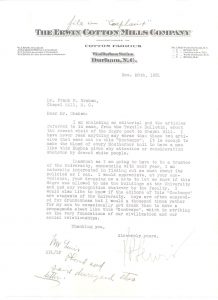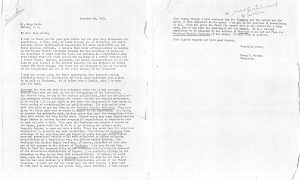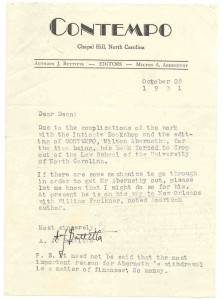
Eighty-one years ago this week, Langston Hughes visited UNC and gave a reading at Gerrard Hall, which was preceded by the publication of an essay by Hughes on the Scottsboro Boys in Contempo, a local periodical, alongside his poem “Christ in Alabama.” While not an official student publication, Contempo was coedited (along with Anthony J. Buttitta) by Milton Abernethy who was a law student at UNC at the time. (The magazine’s archive is held in the Southern Historical Collection.)
Hughes’s essay and poem caused quite a stir among some local residents and led to a flurry of editorials and articles as well as a slew of angry letters sent to then-President Frank Porter Graham. Many letters are collected in the Frank Porter Graham Records in University Archives.
One critical letter came from K.P. Lewis, secretary and treasurer of the Erwin Cotton Mills Company (see oral histories related to the company in the Southern Historical Collection). Lewis wrote to express his outrage and, since he was to become a university trustee the following year, inquire what university policy allowed “this Negro [. . .] to use the buildings at the University.”

President Graham’s response to Lewis describes Buttitta and Abernethy as “taking advantage” of Hughes, convincing him to write a “sacrilegious poem and sensational article,” both of which Hughes read at the Gerrard Hall performance.
Contempo’s editor, Anthony Buttitta, also wrote to President Graham. His letter describes his fellow editor’s decision to leave UNC to join William Faulkner in New Orleans. Buttitta later did the paperwork and footed the bill to make Milton Abernethy’s withdrawal official.

Not all of the letters to President Graham were negative, however. A librarian at the Virginia Theological Seminary and College wrote to President Graham to request that they be added to Contempo’s mailing list.
For more about this event, read Hughes’s description of his visit, “Color at Chapel Hill,” in The Langston Hughes Reader and this blog post from the Southern Historical Collection. The North Carolina Collection has copies of Contempo as well as a history and index of the magazine.
